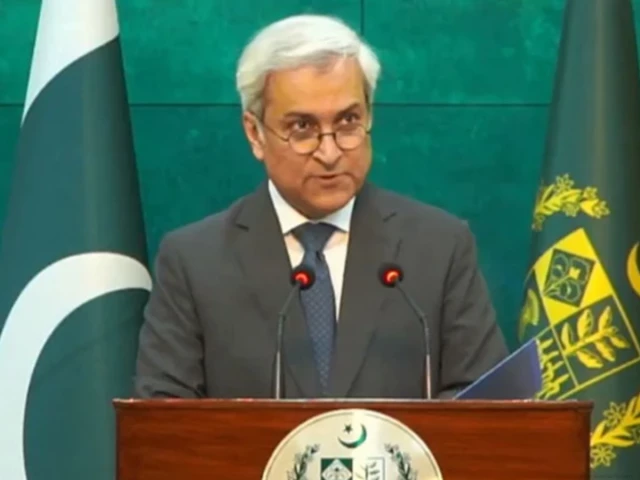Turkish and Qatari mediators are continuing talks with the Afghan Taliban delegation on Pakistan’s demands to end cross-border terrorism as efforts intensify to reach an agreement before the scheduled end of ongoing talks.
At the weekly media briefing on 17 October 2025, Foreign Ministry spokesman Tahir Hussain Andrabi said Pakistan had presented its case to the mediators “in a comprehensive, evidence-based and logical manner.”
🔴LIVE: Spokesperson’s weekly press briefing 07-11-2025 at the Ministry of Foreign Affairs, Islamabad
— Ministry of Foreign Affairs – Pakistan (@ForeignOfficePk) 7 November 2025
The two-day talks, held under restricted media access at Istanbul’s Conrad Hotel, are the third round of engagement between Islamabad and Kabul following deadly border clashes last month. Intelligence chiefs from both countries are leading their sides in talks aimed at establishing a framework for monitoring and verifying counterterrorism commitments.
Read: Marathon Istanbul talks seek to break deadlock
“The Pakistani delegation has handed over its evidence-based, legitimate and logical demands to the mediators with a singular goal of putting an end to cross-border terrorism,” Andrabi said.
“The mediators fully supported Pakistan’s position on the basis of evidence provided by our side, as well as the principles of international law and principles.”
He added that mediators discussed Pakistan’s demands point by point with the Afghan delegation. Sources described progress as “encouraging”, although agreement on verifiable enforcement against terror groups remains elusive, and officials said talks could be extended if required.
Border clashes and previous rounds of negotiations
The current round follows weeks of shuttle diplomacy following border clashes between October 11 and 15, which brought relations to their lowest point since the Taliban took power in 2021. Hostilities began when militants reportedly attacked Pakistan from Afghanistan on October 11, following Taliban allegations of Pakistani airstrikes into Afghan territory.
After the initial skirmish, several clashes occurred along the border, including attacks on camps in Afghanistan. A 48-hour ceasefire was agreed on 15 October, paving the way for dialogue. During a brief exchange of fire at the Chaman-Spin Boldak junction, two persons, including a woman, were killed, testing the shaky ceasefire.
Pakistan had pressured the Afghan Taliban to distance itself from the banned Tehreek-i-Taliban Pakistan (TTP) and take concrete steps against anti-Pakistani elements operating from Afghan territory.
Islamabad has sought a clear decree from Kabul expressly committing to disassociate itself from the TTP. Mediators are reportedly working to reach a balanced understanding, with potential areas for convergence including counterterrorism cooperation and border security protocols, although mistrust and Kabul’s ambiguous stance on the TTP remain challenges.
Read more: Make or break talks: Pakistan, Afghan Taliban meet in Istanbul today
Since the clashes, representatives of Pakistan and the Afghan Taliban have held two previous rounds of talks – first in Doha and then in Istanbul. While temporary ceasefires were in effect, no final agreement has been reached.
After the second round, Information Minister Attaullah Tarar tweeted on 29 October that the talks “failed to produce any workable solution”, adding that Pakistan would continue to protect its citizens from terrorism.
Mediators from Turkey and Qatar intervened, issuing a joint statement on October 31 saying that “further modalities for the implementation will be discussed and decided” during a main-level meeting in Istanbul on November 6. The delegations arrived in Istanbul on Wednesday for the third round, which began yesterday, after surviving the brief cross-border flare-up.
In an earlier briefing, the State Department dismissed remarks made by the Afghan interim foreign minister during his visit to India, calling them an attempt to divert attention from terror sanctuaries on Afghan soil. The spokesman reiterated that Pakistan’s October border operations were defensive, targeting only militant infrastructure, noting that the 48-hour ceasefire from October 15 had given way to dialogue.
The FO also criticized references to Jammu and Kashmir in the October 10 India-Afghanistan joint statement, calling them “a violation of UN Security Council resolutions and an affront to the sacrifices of the Kashmiri people.” The spokesman recalled that Pakistan has hosted nearly four million Afghan refugees for decades, while reaffirming its vision for a peaceful and stable Afghanistan.



